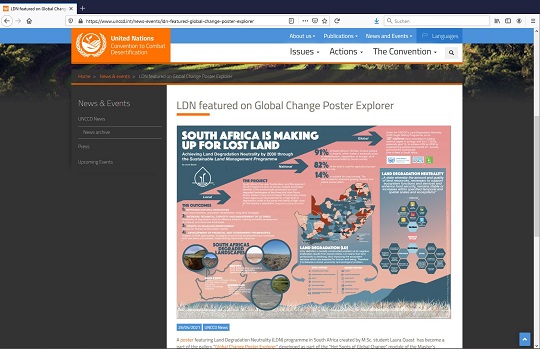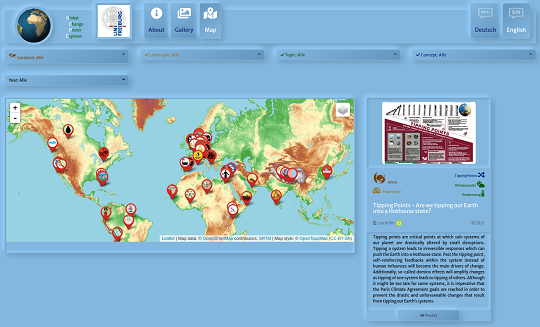Student work on the geography of global change
Freiburg, Aug 26, 2021
In the grand finale of a seminar taught by Professor Rüdiger Glaser, geography students not only learned how to design graphic art, they also achieved public success - A Poster Gallery created from their final papers on the "Geography of Global Change" attracted the attention of the United Nations.

The United Nations Convention to Combat Desertification (UNCCD), a section of the UN, used geography students' posters on its website. Screenshot: unccd.int
Geography student Laura Quast had only wanted to ask the UNCCD, a subdivision of the United Nations that deals with combating desertification, whether she could use the United Nations (UN) logo for an infographic on sustainable land management in South Africa. The people in charge there, however, first wanted to check what the work was about. When they did, they were then so enthusiastic about Quast's poster that they immediately used it as the lead for the UNCCD website. “It's not only a great motivational boost for the students to be able to show such a high profile reference,” says Professor Rüdiger Glaser from the Department of Physical Geography. He was delighted, too. “Our students always put a lot of effort into their theses, but afterwards they often have the feeling that their efforts have somehow faded away and that their work will never be seen again. That's why it's also an important incentive for teaching to be able to point out that what is achieved in a course of study can also be publicly visible.”
Publication visibility
But Glaser initially had to curb the student's enthusiasm somewhat - first of all, assessment had to take place at the end of lectures, the poster had to be given a uniquely assignable identifier, the Digital Object Identifier (DOI), and it had to be released in the FreiDok publication format provided by Freiburg University Library (UB) - all important procedures for sustained visibility. “It was an important teachable moment, having to refer to this procedure, and also to the fact that as soon as it comes to publishing, you have to deal with copyright issues,” says Glaser. “If you research any topic online, you'll find endless sources, but not everything is free to use. For a generation that grew up with a different understanding of digital communication, it's important to raise awareness.” In addition, academics themselves are also in favor of copyright when they create graphics or write books, and they don't want their intellectual property simply adopted arbitrarily.
And as the Freiburg example shows, respect for copyright creates contacts and sometimes even has pleasant side effects. If Quast hadn't asked for the rights to use the UN logo, her poster would have gone unnoticed there. “Now we are very happy and very proud that this format has received such attention and has actually been released on a UN subcluster,” Glaser says happily. “It soon had several hundred thousand hits. It's great when an institution like the UN ennobles the quality of our work in such a way.”

Lithium mining in South America or the water crisis in London: The Global Change Poster Explorer enables users to find out about various aspects of global change. Screenshot: Global Change Poster Explorer
Geovisualization is a core research focus in Freiburg
The success of this one poster may well be seen as the success of the entire poster gallery on Global Change, which was linked on the UN website. The posters provide information on various topics such as lithium mining in South America and the water crisis in London. The high quality of the posters has to do with the fact that there is a focus on geovisualization at the Freiburg faculty. “One of the specifics of geography is that we still do a lot with maps and illustrations,” Glaser says. “Geographic information systems have become an important tool, but so have all other forms of visualization.” “Learning how to didactically simplify, condense, and yet emphasize content accuracy is really a characteristic of geography,” Glaser says. “In doing so, we've found that poster design in particular is a very creative and highly anticipatory final format. For young researchers, it's often their first accolade - to present a poster on their topic at conferences and congresses.” Glaser, who himself was a member of a panel for the evaluation of poster galleries, has also adopted the criteria developed for his teaching. They are: Look at me. Read me. Ask me. “It has to be a lead story that attracts attention through text, through color, a picture or a motto. Then, of course, people want to read it, they approach it and look at it. And then it should not be so finalizing that you get a summary, as with an article, rather, that you start to communicate,” says Glaser, “We've made that a principle for us on the team as well.”
Online poster gallery as open science
This principle was tested in a master's module and was immediately so successful that doctoral student Michael Kahle, who had the necessary programming skills, developed the idea further into an online poster gallery. Kahle also taught the skills needed for FreiDok publication via the UB and coordinated it. “Because it's also very important that the students see that they can create something there that will be noticed by the public and be citable,” Glaser says. Everything that is created within this framework is thus also made available as open science under a creative commons license. “We are convinced of the value of the idea,” says Glaser. “We are very much in the here and now with the Global Change thematic canon, and we put a lot of emphasis on outreach. There is no final paper in which the visualization element is not called for and assessed. It's practiced and practiced again and again in the seminars; it's an important cognitive strand in geography. And we're glad that UB provides the framework to adequately present the results of our efforts.”
Jürgen Reuß

